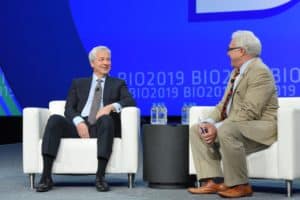For some time now, markets seem to have convinced themselves that there will be no recession in the US; the CEO of JPMorgan Chase, Jamie Dimon, disagrees.
In fact, according to Dimon, the risk is still high, because he believes it is a mistake to think that growth will continue without stopping.
Jamie Dimon’s words about the possible recession in the US
The CEO of JPMorgan Chase attended Barclays’ 21st Annual Global Financial Services Conference, during which he spoke along with Jason Goldberg.
At one point he said that a true normal credit cycle does in fact imply a recession, and that this is quite predictable.
Indeed, according to Dimon, within a normal credit cycle sooner or later something always goes worse than normal, and there are some sectors, such as real estate, that are likely to do worse than normal this time as well.
He did not expressly say that he expects a recession in 2024, but it is clear from his words that the scenario he thinks is most likely is that a recession will arrive sooner or later, before the current credit cycle is over.
He also stated:
“And I’m not saying it’s going to happen. We don’t know, I don’t spend a lot of time guessing about outcomes of soft landing, medium recession, hard recession, because nobody knows.”
However, he also urged people to prepare for such an event.
The causes
According to Dimon many people are making the mistake of looking at the numbers in real time, without, instead, pausing to think about the future.
He says the future involves a quantitative squeeze because “we’ve been spending money like drunken sailors around the world.”
The mistake that is supposedly being made is to believe that the economy would remain in strong growth for many years.
However, if one analyzes the annual US GDP growths in recent years, one finds that the continued strong growth described by Dimon has not been there.
It is true that from 2015 to 2019 the US economy was always growing, but at a pace that was not particularly strong.
In 2020 there was a thud, due to the pandemic, and the strong growth of 2021 was just a rebound after the 2020 slump.
Taking data from the last two years as an example, even in the first six months of 2022 there was a contraction, albeit not a significant one, and the first two quarters of 2023 ended with 2% growth, which is not that much at a time when inflation has been well above 4%.
Expansionary monetary policies
Between the lines of what Dimon said there is an accusation of the Fed‘s expansionary monetary policies.
In the 2020/2021 biennium alone, the US central bank’s balance sheet has soared from $4 trillion to nearly $9 trillion, with obvious subsequent negative spillovers on prices.
And so in the 2022/2023 two-year period the US had high inflation and high cost of money, at levels not seen in forty years.
But despite this, the actual recession did not materialize, except during the first year of the pandemic and during the first six months of last year (though very little).
In addition, the period of quantitative tightening (QT) that Dimon alluded to actually began some time ago.
More than a year ago, the Fed even began withdrawing from the markets some of the liquidity it had injected into them with QE over the previous two years.
For now it has withdrawn very little, and so QT could in theory go on for a while longer, but with interest rates so high the Fed is proceeding very cautiously with QT.
If such a framework has not yet triggered a recession, perhaps the markets are right that one is not coming anytime soon.
Dimon, on the other hand, is convinced that the markets are actually focused only on the short term, and that they do not understand that in the long run this situation is expected to lead precisely to a recession.


